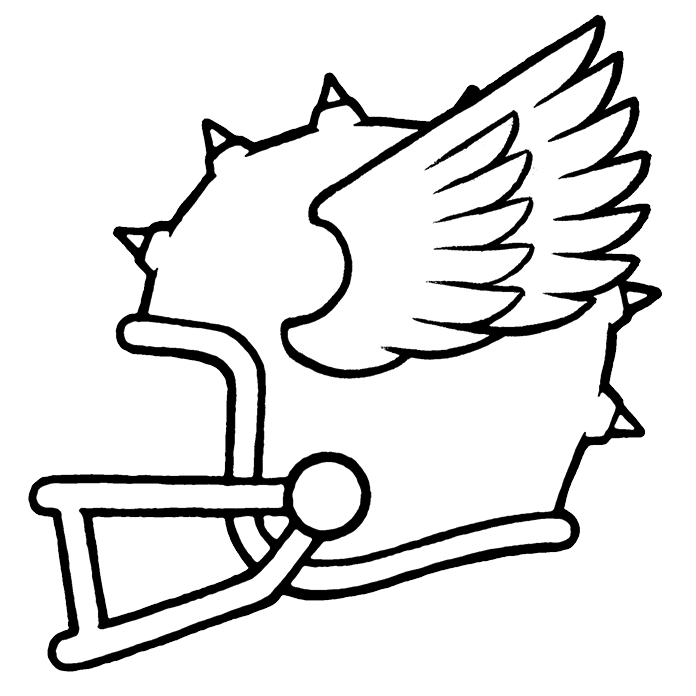Kick (General) #
The player is an expert at kicking the ball and can place the kick with great precision. In order to use this skill the player must be set up on the pitch when his team kicks off. The player may not be set up in either wide zone or on the line of scrimmage. Only if all these conditions are met is the player then allowed to take the kick-off. Because his kick is so accurate, you may choose to halve the number of squares that the ball scatters on kick-off, rounding any fractions down (i.e., 1 = 0, 2-3 = 1, 4-5 = 2, 6 = 3).
Overview: #
Kick is a great skill to take for every team at some point in their development, some will try to get it earlier than others though. The main benefit, more so than the lower chance of a touchback, is dictacting somewhat how the other team will play their first turn. The general rule of thumb is to kick deep (nearer the opposing endzone) against slower teams who will cage and kick shallow (near the LOS) against faster passing teams.
You want to kick deep against the slower teams because it makes it harder for them to pick the ball up and get it into a safe cage. To combat this they will either need to form a cage deeper in their own half, which means they have further to move the cage safely to score, or do some more risky plays with the ball, perhaps a pass, catch and maybe some go for its. They then run the risk of potentially dropping the ball at some point, leaving the ball carrier exposed, or leave you in a position to cut the ball carrier off from the rest of his team.
Kicking shallow against the faster teams again will force them into more dice rolls if they want to get the ball back deeper in the hands of their thrower. Should they fail to pick the ball up, your players will also be in a better position to perhaps recover the ball. The nearer it is to the LOS the higher chance your slower players can get there. To combat that, they will have to move some players over to cover the times they fail the pick up. This will usually put those players out of position for what they had planned. Most times those players would have been used to try and break through your defence and get some players down field to try and spread your team out. If they have to cover a pick up instead, this keeps them all the other side of you which will allow you to mark their receivers easier. You could also be in a better position to box their team in and start hitting their players. If you had kicked deep and have no players with enough movement to get where the ball lands, they don’t need to worry about failing the pick up, as they have another turn before you can threaten to get to the ball.
Against teams that have a fair few players missing, through either injury or being Knocked Out, you can kick the ball to an area they couldn’t cover due to the lack of players. You can also take the most advantage of teams who set up badly. If an Orc team for example sets his team up too far up the pitch, kicking the ball behind him can really be a pain for him. Kick really forces your opponent to spread his team out more than they would usually when setting up. This can give you player advantages on areas of the pitch (with regards to getting assists), or just leave you more space to move in, perhaps getting at the ball carrier easier.
Obviously the lower chance of a turnover is also of help, if the ball lands on the pitch they at then least have to roll to pick the ball up, more rolls is more chances to fail something. It is also of great help against Throw Team Mate one turn touchdowns. If you can land the ball somewhere where they can’t pick the ball up and hand it off to the awaiting player to get thrown, then they can’t score in one turn.
When aiming your kick, most players normally just put it in the centre of the opposing half as this has the lowest chance of a touchback. If you have kick most of the time you will look to aim it 4 sqaures in from the sideline and either the end zone or the LOS, depending if you are kicking deep or shallow. This again lessens the chance of a touchback. If you are feeling more daring and don’t mind the slight extra risk of a touchback you can go 3 sqaures away instead, in either one or both edges. This allows you a bit more control of the area in the pitch the ball lands. It will only go for a touchback if you roll a 6 or it lands next to the sidelines and then bounces out.
Remeber though just because you have kick doesn’t mean you have to use it. You get to choose if you want to use it after rolling the scatter, so if it serves you better to have the kick go the full scatter distance instead, you can choose to use that.
Benefits: #
- Lower Chance of Touchbacks
- More Control where the Ball Lands
- Dictate the Other Teams First Turn More
Useful to: #
As explained above it can be a really great skill for every team, though the faster more agile teams can take advantage of mistakes in the back field easier. It is also more of a pain to deal with for the slower teams, these two reasons combined make it a high priority skill for Skaven, Elvens teams, and Humans.
Typically the player you want to give Kick to will be a Lineman. They can take it on a normal roll and your positional players will usually have other skill choices that you want to give them. This means those teams will want to try and skill a Lineman to get Kick as soon as they can, for Elves this should be fairly easy, as a completion and MVP will grant their first skill.
One thing to bear in mind though is that you will want to try and keep your Kick player alive for any time you have to kick off. This means you will hopefully not have him on the pitch at all when you are receiving the kick off. This is even more vital if they only have Kick and no other skills to defend themselves with. You can be sure if he is on the pitch otherwise, other teams will try and target them.
For slower teams, or any that don’t start with many skills, then Kick is a somewhat lower priority. Your team needs to really gain some of the more basic skills first. There is no good taking kick if you can’t take advantage of it afterwards. Also these teams will typically have their Linemen in the thick of it getting hit and such like. They will need to take skills to help with that job first then look at getting Kick a bit later.






